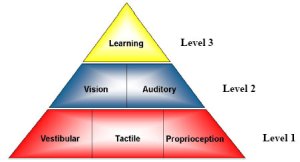What’s the point?
A mother of a boy with autism asked me once right there in the middle of a session: “What’s the point of him swinging so much, I can do that with him in the park?” As I went deeper and deeper into explaining the concepts of sensory integration and why her son needed the vestibular input and how swinging would help him in school, a parallel train of thought started unwinding in my head. Does this lady see the big picture here? There she was, a gorgeous, polished and relatively young mother of this boy. She was always very polite and in the mood for at least a small talk. She rarely stayed in the sensory room but when she had questions, she would stay inside and I would take some time from the session to talk to her and make these concepts a little bit more close to her. So, after many years of explanations from my boss, and a couple of extra years of explanations from me, she kept asking the same question: “Why are you letting him swing so much, I can go to the park and let him swing there for free.” Now, let me just be clear about this, she was definitely not a stingy lady, just the opposite. So, for all those who can’t see the forest for the trees… What’s the point of sensory integration therapy?
Sensory integration has practically one ultimate goal, with small goals in between. The ultimate goal is to help children with any kind of developmental disorder or delay learn. When a child has sensory deficits, they find learning to be very tiring, tough, uninteresting etc. One very important goal that helps us getting to the learning process is the (self)regulation. This is a very tricky one. It is the one that is very individual and rarely you will find a nice and simple equation to get to the regulation and self-regulation point in a child. One day jumping and rolling on the floor will be a bingo, but tomorrow that might cause a tantrum.
Piaget nicely indicated that play is the work of children. They learn a lot better when actively participating as oppose to being told what to do. So, what’s a better way of helping children in their journey to the land of knowledge than the sensory smart play. I follow the child’s interests, observe their sensory appetite and I try using that to help them learn new things; whether a skill, or a word. Some children can only function and learn while getting their stimuli whereas some children are ok with being stimulated first and then afterwards successfully getting the task done. So, in order to get the cognitive tasks done which are on a higher level, we need to sort the basics that our body needs first.

I’ll try making this even more clear. In order to successfully learn, you need to be ok with your sensory self. You don’t need to be perfect and rarely somebody is. But people and children with a more substantial sensory disorder will find learning very tough. However, we can learn to compensate our sensory deficits to be able to function normally with every day challenges (taking a shower, putting clothes on and getting out of the house, getting a haircut, sitting in a class, having coffee in a crowded mall, cooking a spicy dish, reading a book, writing a paper, etc.). So, this is the big picture: settling the sensory basics for the higher cognitive tasks such as learning.
And just an FYI… If you ask me, sensory integration, yes, it can be a therapy, but I would rather if parents and adults used it as a lifestyle. Think, breathe and live (and play!) in a sensory way. Don’t wait for those one or two hours a week for your OT to work with your child and help them regulate. Talk to your child’s therapists, learn from them about your child’s sensory needs and implement them all the time: while the child is eating, when the child needs to brush his teeth and go to bed, on your way to the preschool, etc. I don’t think a parent should necessarily acquire a role of a therapist, actually better if not, if possible. But, hopefully you play with your child anyway, why not making it sensory friendly in your own home or a park. So, to answer the question that a patient’s mother asked: if I let your child swing as much as his brain needs, that will regulate him and thus he will learn better. And yes, I would love it if you would take him to the park to swing more, whenever the boy wants and needs (I only assume his biggest need would be before and after his classes).